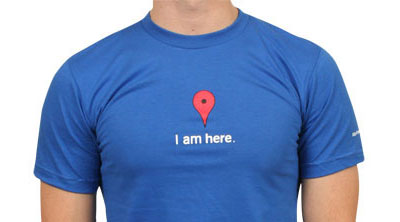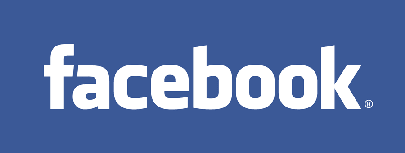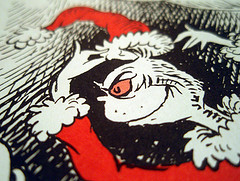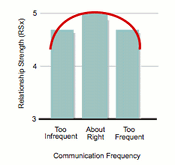Predicting where things will be in the next 12 months is notoriously difficult as you don't know what you don't know, and an unexpected innovation can pop up at any time. However as respected journalist and technologist John Battelle said in his blog recently about the "next big thing":-
Often times what's directly in front of you is, in fact, the next big thing.
Something however that doesn't need any amount of prediction is that there will be a peak in the sales of commemorative tea-cups, plates, tea-towels and other Royal memorabilia in 2011. With the recent engagement of Prince William and Kate Middleton it seems we'll have the first Royal Wedding in a quarter of a century as well as an additional bank holiday for us Brits to enjoy it. 2011 will be the year of wedding fever, nostalgia, bunting and street parties.
This does neatly segway into another type of engagement however - customer engagement and the associated loyalty we look for from it. What 2011 looks like for loyalty is a little harder to predict - there are no fixed dates or big events. There are though some key trends that we are seeing in the wider market which will all impact on loyalty in some way - taking us one step closer to solidifying that customer engagement into wedded bliss.
No self respecting bride however would consider walking up the aisle without taking account of the Victorian tradition of taking something old, something new, something borrowed and something blue - and neither shall my loyalty predictions.
Something old - Coalition
Coalition programmes have been around for decades, starting with the original stamp collecting programmes. However they have really come of age now with existing programmes going from strength to strength and new programmes rolling out worldwide. Group Aeroplan has recently launched Nectar Italia and Nectar Chile and Loyalty One has taken stake in Dotz in Brazil. Now American Express has bought Loyalty Partners who run PayBack in Germany. Ed Gilligan, American Express Vice Chairman said of the deal:-
“The loyalty coalition model is growing rapidly in many parts of the world [and] Increasingly, consumer decisions about where to shop and how to pay are based on loyalty offerings"
It's not just the growth of new programmes, the existing ones are also gaining strength, with Nectar UK recently following up it's new partner Homebase with leading utility company, British Gas.
This is a high growth, and increasingly competitive area so expect to see more of these programmes coming to a country near you.
Something new - Geo/Local

You can't have failed to miss the explosion of Groupon in 2010. It's meteoric rise culminated in Google trying to buy it for a reported $6bn and when that fell through they then managed to secure $0.5bn in additional funding. While Groupon has an interesting (but not unique) business model, what really makes it interesting is the local merchant aspect. Representing about 1/3 of all sales within the US, these independent retailers are a large pool to fish in, but the challenge has always been economies of scale.
What Google ad-words did for online marketing however, services like Groupon are doing for offline. Barclaycard Freedom is another example of scheme engaging the thousands of small independent retailers and although this has yet to become well established, I think the prospect of creating services that engage local merchants will grow.
The reason for this is simple - relevance. All brands need to be relevant to get cut through and it's much easier to be relevant when the marketing is from a local restaurant or retailer than when it relates to an increasingly sterile national (or global) brand. It also provides larger brands with the ability to target marketing spend more effectively, rewarding spend at locations that have room to grow without simply rewarding spend everywhere.
As Fast Company recently reported on Google's move into this area and it's recent move of Marissa Mayer from Search Products to Geo/Local, Google said
"Marissa is moving over to an exciting new role covering geo/local, which is crucial to our users and the future of Google" (emphasis added)
It's not just Google, Facebook or Foursquare that get this; location is going to be a key variable in our marketing toolkit in 2011.
Something borrowed - Gamification

Well 2010 was when gamification really burst upon the scene and along with it a lot of controversy about the term itself. However, despite the controversy most people agree that the idea of utilising gaming dynamics to help create motivation is worthwhile.
It's interesting that currently early adopters have been either online communities/e-commerce sites or offline automotive companies with both Ford and Nissan using gaming mechanics to improve driving techniques within their electric vehicles.
I think 2011 will see this become more mainstream, with full blown traditional loyalty programmes such as hotel, airline or retail loyalty utilising gaming mechanics explicitly. As I've blogged about a number of times this year, this one trend has the possibility to really lift levels of engagement within a loyalty programme and looking forward, to possibly remove the redemption currency itself (and the associated liability)
You don't get very far however within gaming mechanics before the need to go social kicks in - the real power being based on the bragging rights that come from achievement - and so this is the theme of the final predication.
Something blue - One word. Facebook.

Facebook has come of age. It now has the majority of the Western world assimilated into it's network. It has the lions share of their online attention (recently beating Google) and a depth of information on individuals that rivals Wikileaks.
Retailers like JC Penny and Best Buy are integrating their e-commerce offerings directly into Facebook and brands such as Oreo cookies are now driving all of their traffic to their Facebook page. The reason for this is simple - brands want to fish where the fish are, and Facebook represents a very big ocean.
What's interesting though is not the use of Facebook, brands have been doing this for a while now. It actually that Facebook is for many brands starting to replace their own online offering. I think in 2011 we'll start to see loyalty programmes actually launching their online offering directly within Facebook or at the very least, using Facebook Connect for security.
This will bring three huge benefits. The first is simplicity. Members will be able to login and service their loyalty accounts without any effort - no credentials to remember. The second is interaction. Members will be able to see posts from their loyalty programme directly within their social feeds - no email, no direct mail and much more immediate. The final benefit is social proof - members will be able to see what other friends are doing, what other friends have bought and what other friends have redeemed for.
Combine this with the potential that Facebook brings to virtual goods in the form of social gaming - something that Amex has recently introduced into the Membership Rewards programme and that Citi qucikly followed by introducing them into the Thank You programme - and you have a major change in how loyalty programmes are designed and deployed.
Whether proprietary or coalition loyalty, the marriage of these three main trends of location, gaming and social will change the face of loyalty over the next 12 months.
Image credits: Google T-Shirt, Badges,
 Visa Europe
Visa Europe 
 We saw exactly this effect in some
We saw exactly this effect in some 